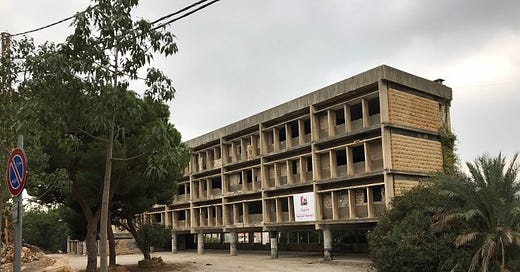Lebanon as a Deradicalization and Mission Laboratory
The MENA church has some important lessons for us about mission, racism, polarization, extremism and deradicalization.
I always thought Lebanon was a scary, dystopian place. Bombed out buildings, sectarian strife, violence and kidnappings, a fragile and then crashed economy and a non-functional government hampered by decades of corruption. Signs of the civil war are still everywhere. Bullet holes and partially destroyed buildings sit abandoned and are visible in many areas of the country. My sister and brother in law, who lived in Detroit for a long time, always used to say ‘sounds familiar.’
Lebanon may be one of the most blatantly hostile, polarized and internally-divided countries in the world. .. but also home to a growing church.
Lebanon is an interesting laboratory to study extremism, sectarianism and mission. Society is divided into three major groups by religious identity (Shia, Sunni, Christian) and then as many as 17 other sects along ethnic, religious and historical lines. Many of these have their own militias that guard entrances to neighborhoods. The largest is Hezbollah, boasting a military force larger than the central government. Gun ownership ranks in the top ten in the world most years (link). It may be one of the most blatantly hostile, polarized and internally-divided countries in the world.

But Lebanon and some of the surrounding countries also are home to a growing church and quite successful models of deradicalization and grass-roots counter-extremism happening organically through mission efforts. By 2012, as millions of refugees came from neighboring Syria, churches and Christian non-profits started serving those fleeing from violence. I commonly heard evangelicals were the only ones serving everyone, not discriminating based on ethnic or religious affiliation. As a result, many Sunni or Shia Muslims actually met Christians for the first time… and they had surprisingly positive experiences.
As time went on churches and organizations were reporting dramatic conversion stories of former extremists, fighters and terrorists were not only leaving violence behind but they were considering the claims of Jesus. As they were going about their humanitarian work, medical clinics, informal education and visitation, a trend began.
I was intrigued and started researching this phenomenon undertaking formal doctoral work with the Extreme Beliefs/Strong Religion research group out of the Vrije Universteit Amsterdam.
Thousands of extremists have deradicalized, and as many as 40,000 Muslims have converted to Christianity in the Levant since 2015.
What I found has been blowing my mind for years. Thousands of extremists have deradicalized, and as many as 40,000 Muslims (according to one organization) have converted to Christianity in the Levant (Jordan, Iraq, Syria, Lebanon) since 2015. Lebanese Christians, who hated Syrians for decades and saw them as occupiers and belligerents now welcome them into their communities. Churches grew exponentially and diversified significantly to include Syrians, Lebanese, and former Druze, Shia, Sunni, etc. One faith community I observed had members from nearly every strata and ethno-religious group represented, doing life and serving together.
When I first got involved in non-profit work and mission efforts 25 years ago I frankly had a US-centric skewed perspective. I assumed ‘we’ had to bring some kind of order ‘over there’ through humanitarian work and the gospel. What I came to discover is that many of the national Arab churches had been long at work, with millenia long histories. They’ve learned and demonstrated how to love one’s enemies. They have been salt and light in difficult, hostile environments and demonstrated that beautiful community can be built in diverse and even sectarian societies.
I hope to share some of the stories I’ve heard in the Levantine laboratory and curate some conversation around these topics. The strange intersection of mission, deradicalization, extremism and the church is a fascinating area to explore. The Middle Eastern Church has much to teach us about how to confront racism, polarization and extremism, what mission looks like in hostile environments and how practicing the ways of Jesus might actually work. Will you come along and learn with me?



